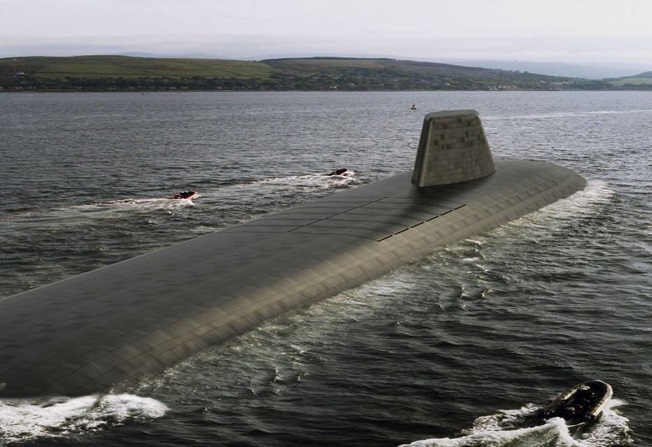
LONDON — The unshakeable reliability of Britain’s submarine-based nuclear deterrent has been called into question after a Trident II D5 ballistic missile reportedly veered off course during a test last year.
Vanguard-class submarine HMS Vengeance launched the unarmed missile during a post-refit demonstration and shakedown operation (DASO) off Florida in June 2016.
News of the test failure remained a closely guarded secret until last weekend, when the London-based Sunday Times revealed that the Trident system suffered a “serious malfunction” in a front-page story that sent shockwaves through the U.K. political establishment.
Media reports suggested that a navigational error may have occured and that the missile steered towards the U.S. east coast instead of continuing its intended course over the Atlantic Ocean towards Africa.
The revelation provoked fury among some opposition lawmakers, who said the test failure should have been disclosed prior to a highly-charged Parliamentary debate the following month on whether Britain should renew its strategic nuclear deterrent. On July 18, MPs voted overwhelmingly to replace the Vanguard-class SSBNs with four new submarines at a cost of up to $50 billion.
Allegations of a government cover-up were fuelled when new Prime Minister Theresa May, interviewed on television on Sunday morning, refused four times to say whether she had known about the malfunction before the debate. May said only that she had, “absolute faith in our Trident missiles”.
Although the Ministry of Defence has insisted that the DASO was successful – Vengeance was certified to resume deterrent patrols – officials have steadfastly refused to divulge any information about the incident, citing the need for secrecy in matters of national security.
However, the opposition Labour party described the alleged test failure as “catastrophic” and said it undermined confidence in the UK’s security strategy.
On Monday, responding to an urgent question tabled by Labour, Defence Secretary Michael Fallon told the House of Commons: “Contrary to reports in the weekend press, HMS Vengeance and her crew were successfully tested and certified as ready to rejoin the operational cycle.

“I can assure the House that the capability and effectiveness of the U.K.’s independent nuclear deterrent is not in doubt. The government have absolute confidence in our deterrent and in the Royal Navy crew who protect us and our NATO allies every hour of every day.
“There are few things that we cannot discuss openly in Parliament, but the security of our nuclear deterrent is certainly one of them. It has never been government practice to give Parliament details of demonstration and shakedown operations”.
Julian Lewis, a member of the ruling Conservative party and chairman of the Commons’ Defence Select Committee, asked: “Is the Secretary of State telling us that nothing went wrong on this particular launch?
“While accepting that the nuclear deterrent needs to be shrouded in secrecy, it also needs to deter. Once stories get out that a missile may have failed, is it not better to be quite frank about it, especially if [the failure] has no strategic significance, as, in this case, it probably has none?”
Labour MP Mary Creagh told the House that a U.S. government official had confirmed to CNN that the missile automatically self-destructed off Florida. “If that is the case, whey are the British Parliament and the British public the last to know about it?”
Another Labour member, Kevin Brennan, suggested that the government’s silence made “no sense at all, given that … our American counterparts in Congress will certainly be given full details of what happened in the test”.
Brendan O’Hara of the Scottish National Party, which is fiercely opposed to Trident renewal, said: “Given that one of the U.K.’s nuclear missiles veered off towards the United States, it is an insult to our intelligence to try to claim, as the government have, that Trident’s capability and effectiveness are unquestionable”.
Fallon responded: “I am not confirming the speculation in the weekend press, and I caution Members against believing everything they have read in the weekend press.”
In a reference to heightened tensions with Russia, Fallon added: “Earlier governments in different situations – indeed, in more benevolent times – might have taken different decisions about how much information they were prepared to reveal [about DASO]. These are not, of course, such benevolent times”.
He was contradicted by Admiral Lord West, a former First Sea Lord and security minister, who told U.K. media organizations that the government’s failure to acknowledge a “minor fault” with a missile system was “bizarre and stupid”.
The Trident II D5 missile has completed more than 150 successful test flights since design completion in 1989, according to manufacturer Lockheed Martin, with the vast majority of them conducted by American submarines. Britain’s cash-strapped navy has carried out just five test firings since 2000, due primarily to lack of funding (the Sunday Times reported that each test costs about $21 million).
As of Wednesday there was no mention of the misfire on the Royal Navy website, although space was found for an announcement about a new design of kilt tartan for Scotland-based submariners. Faslane naval base near Glasgow is set to become the UK’s only submarine operating hub from 2020.
The new Dreadnought-class SSBNs are being designed and built in cooperation with the U.S. Navy’s Columbia-class boomer program and are slated to replace the Vanguard-class in the continuous at-sea-deterrent role from 2028.





